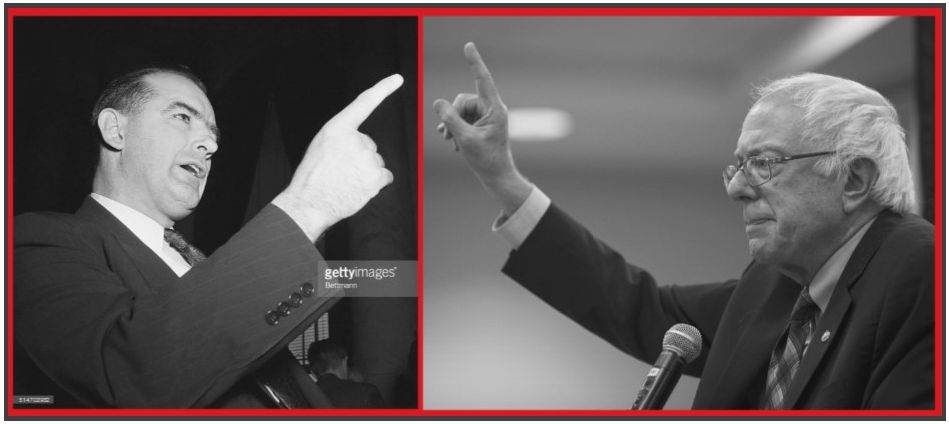
Bernie Sanders, for all intents and purposes, is done in this campaign and probably in his political career.
Nonetheless, as I listen to Bernie bellow, yet again, about the greed that has overtaken this country, it occurred to me that the lens through which one sees life is very possibly the lens through which one sees politics.
For Bernie Sanders, greed is everywhere. Corporations are greedy. Wall Street is greedy. CEOs are greedy. Business is greedy. They are all greedy. The only ones who are not are the down-trodden working class. They work for a living; apparently, no one else does.
I was reminded of the Army McCarthy Hearings of the 50’s. For Senator Joseph McCarthy of Wisconsin, there were communists everywhere. Communists were in the government. They were in Hollywood. They were in the Military. They were in Congress. They were in the woodwork. They were literally all around us. The question wasn’t whether there were communists; the only issue was how many.
McCarthy’s communism obsession is not unlike Bernie’s greed obsession. It overtook McCarthy’s life and credibility and it is shortly about to do the same for Bernie.
The fundamental premise – that business interests in this country are greedy – obviously runs contrary to the development of the species, our nation and the development of civilization.
The driving force behind the very survival of every living organism on our planet is that we all operate in our own self-interest. That is not a bad thing. That’s why organisms tend to survive.
Self-interest gives us the innate need, and of course, desire, to live. It gives us the need as well as the desire to feed ourselves, clothe ourselves, and house ourselves. It gives us the need as well as the desire to procreate.
It is that innate instinct to operate in our own self-interest that builds companies, incentivizes work output, and supports our accomplishments and achievements. Far left social democracies have flaunted that self-interest and paid the price through untold lost generations.
Without whole populations operating in their own self-interest, we assuredly would not have had the development of empires, civilizations, or nation states, for that matter. On the corporate level, in recent times, we would not have had Microsoft or Apple, or Facebook, or thousands of other employment behemoths.
My intention here is not to showcase Ayn Rand themes bandied about decades ago, or remind Bernie Sanders of what Adam Smith centuries ago called the “invisible hand of the market.” But it is to suggest that operating in one’s own self-interest is the underpinning of every aspect of human conduct and is the foundational principle of enterprise, productivity, and a rising standard of living for everyone.
Mind me, that is not to say that self-interest may go unchecked. That’s what laws are for. By establishing laws, we have the opportunity, as a society, to set down the grid on which individuals produce incentivized results in an orderly fashion. These are rules that are promulgated through a democratic process that identifies, in fundamental ways, what we all hold dear.
In our country, that includes the United States Constitution and its Bill of Rights. The scope of written laws which follow tends to codify what we understand to be the rules of engagement. They represent our current rendition of Babylon’s Code of Hammurabi, or ancient Israel’s Leviticus.
Where our promulgated rules of engagement become murky, Natural Law takes over.
It is there that we do our best to fill in the blanks. It is not so much what the law necessarily says – although that is important – but what the law intends, which is more important in the long run. For Natural Law, which underpins what we view as the rational and moral basis for our “code,” we look to supplement definitional distinctions with a balanced sense of right and wrong.
So where are we in this discussion?
First, we accept that we all operate in our own self-interest. Second, we understand that it is for that very reason that we have to submit to the rule of law. Third, we also know that law is not without ambiguity when faced with the myriad nuances life produces and therefore we strive to better understand Natural Law where the concept of fair play and substantial justice resides.
Where does greed fit in that analysis? No clue! If Bernie argued that rules of engagement need fixing, then at least we can have a debate. If he suggested that Locke and Rousseau need to be modernized, then let’s engage rationally.
But, if we start with the fundamental Bernie Sanders creed – all life is greed – we will end up with the polemic of politics, Bernie Sanders style: today’s rendition of yesterday’s proletariat.
If it is true that truth matters – putting politics aside – what Bernie offers is nothing other than the stale rant of the battered politics of separation, where the tone of the rhetoric eclipses the thoughtfulness of the narrative.
As human beings, we have the right to operate in our own self-interest. And we are also expected to operate under the rule of law, guided by our highest social instincts for the moral prerogative – do unto others as you would have them do unto you.
While the dynamic may be challenged from time to time and may need some correction, there is nothing in the American experience which would even remotely suggest to thinking human beings who are not pandering to voters that those fundamental principles are broken.
